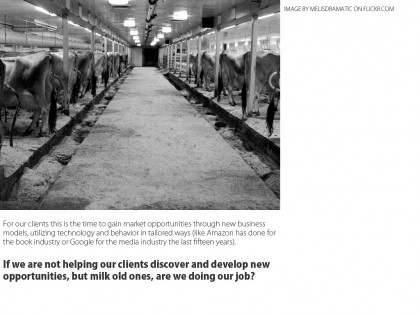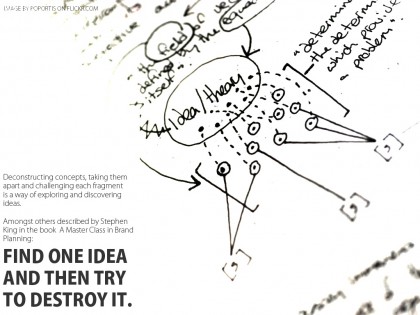Are we challenging the status quo just to settle for an updated version? Is this even a time for status quo?
- One of my personal mantras has always been: “Never stop, as soon as you’ve found a solution – start questioning it”. In an ongoing email discussion William Channer, he asked me to elaborate. I thought the answer would be well worth posting on the blog:
WC: Why is this important to you?:
“Never stop, as soon as you’ve found a solution – start questioning it”
Two reasons:
- 1. This is not the time for status quo’s. Working in an environment where the pattern of platform usage, media consumption and technology awareness in the general public is in constant development means that the currency of our products needs to meet this change. As we have not yet “landed” on the next big thing but finding our way there (we are currently in between generations), settling down can quickly either leave one stranded or result in the loss of a big opportunity.
For our clients this is the time to gain market opportunities through new business models, utilizing technology and behavior in tailored ways (like Amazon has done for the book industry or Google for the media industry the last fifteen years). If we are not helping our clients discover and develop new opportunities, but milk old ones, are we doing our job?
2. Deconstructing concepts, taking them apart and challenging each fragment is a way of exploring and discovering ideas. Amongst others described by Stephen King in the book A Master Class in Brand Planning: Find one idea and then try to destroy it.
The benefit of this process is both a chance to polish the final concept and make sure every detail is perfect, but also to understand how and why the details work, and uncovering new insight in the process. Deconstructing something you’ve already did that worked gives you great ammunition not for copying it, but for finding out why it was a success, and then understanding which specific details in it made it work and why other details did not.
As an example advertisers have always known what types of communication gave an intended effect, but it is only in the last twenty years brain science has been able to tell us exactly why
issues becomes a barrier to pursuing treatment. buy viagra online age..
. Which has led to an offspring of brand new ideas based on the specific knowledge of how the brain works as opposed to just copying known “advertising rules”.

To put it briefly: People constantly adopt and implement new ways of communicating and of fitting technology into their everyday life. By deconstructing our big ideas into smaller fragments we have a better tool for knowing what will work when building solutions on new platforms for new behaviors – and by that the “risk” or “guts” people often talk about when explaining creativity becomes rational and logical – even safe.
This does not make marketing and design boring, but it demands more thinking about thinking. – And it demands as much creativity from the strategic department as from the creative department.



Top article. I agree with the point that it’s important to help clients discover and develop new opportunities. I also think that this discovery process should be an internal activity, almost part of everyones job description where they are required to discover as well.